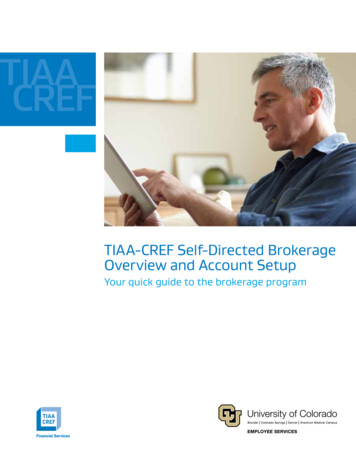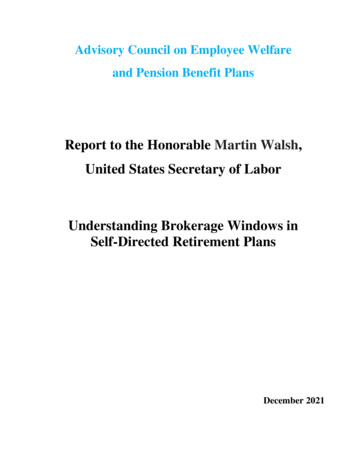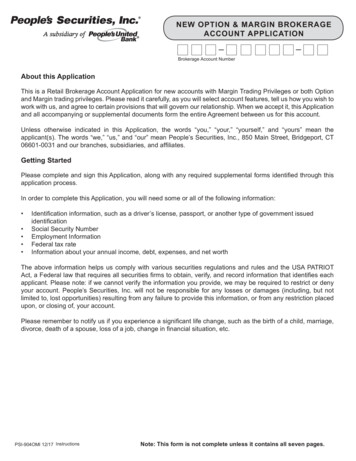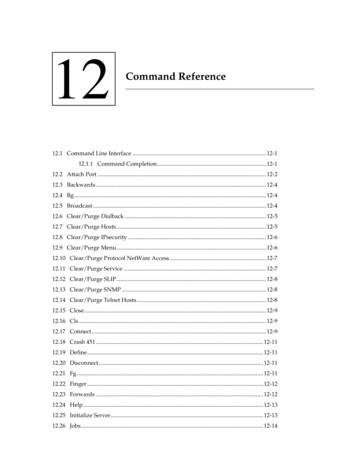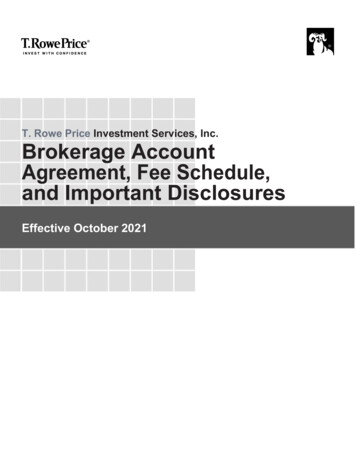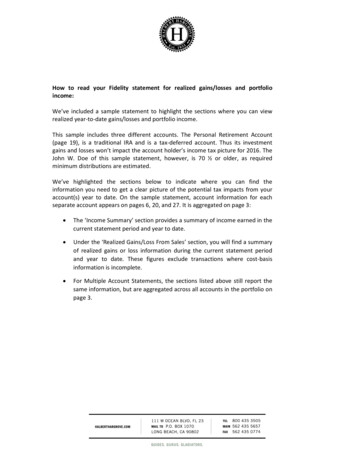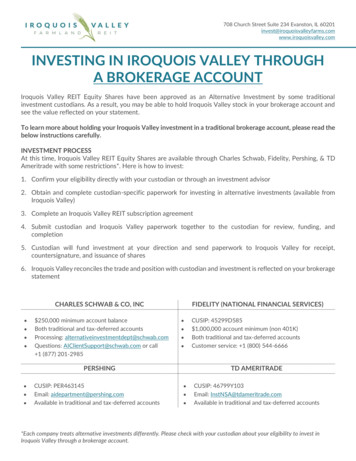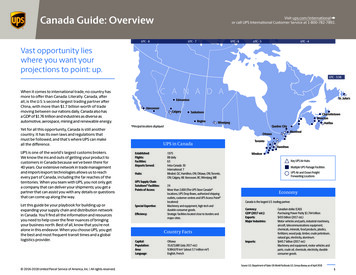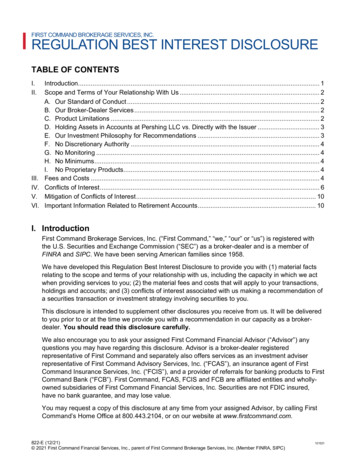
Transcription
FIRST COMMAND BROKERAGE SERVICES, INC.REGULATION BEST INTEREST DISCLOSURETABLE OF CONTENTSI.II.Introduction. 1Scope and Terms of Your Relationship With Us . 2A. Our Standard of Conduct . 2B. Our Broker-Dealer Services . 2C. Product Limitations . 2D. Holding Assets in Accounts at Pershing LLC vs. Directly with the Issuer . 3E. Our Investment Philosophy for Recommendations . 3F. No Discretionary Authority . 4G. No Monitoring . 4H. No Minimums . 4I. No Proprietary Products. 4III. Fees and Costs . 4IV. Conflicts of Interest . 6V. Mitigation of Conflicts of Interest . 10VI. Important Information Related to Retirement Accounts . 10I. IntroductionFirst Command Brokerage Services, Inc. (“First Command,” “we,” “our” or “us”) is registered withthe U.S. Securities and Exchange Commission (“SEC”) as a broker-dealer and is a member ofFINRA and SIPC. We have been serving American families since 1958.We have developed this Regulation Best Interest Disclosure to provide you with (1) material factsrelating to the scope and terms of your relationship with us, including the capacity in which we actwhen providing services to you; (2) the material fees and costs that will apply to your transactions,holdings and accounts; and (3) conflicts of interest associated with us making a recommendation ofa securities transaction or investment strategy involving securities to you.This disclosure is intended to supplement other disclosures you receive from us. It will be deliveredto you prior to or at the time we provide you with a recommendation in our capacity as a brokerdealer. You should read this disclosure carefully.We also encourage you to ask your assigned First Command Financial Advisor (“Advisor”) anyquestions you may have regarding this disclosure. Advisor is a broker-dealer registeredrepresentative of First Command and separately also offers services as an investment adviserrepresentative of First Command Advisory Services, Inc. (“FCAS”), an insurance agent of FirstCommand Insurance Services, Inc. (“FCIS”), and a provider of referrals for banking products to FirstCommand Bank (“FCB”). First Command, FCAS, FCIS and FCB are affiliated entities and whollyowned subsidiaries of First Command Financial Services, Inc. Securities are not FDIC insured,have no bank guarantee, and may lose value.You may request a copy of this disclosure at any time from your assigned Advisor, by calling FirstCommand’s Home Office at 800.443.2104, or on our website at www.firstcommand.com.822-E (12/21) 2021 First Command Financial Services, Inc., parent of First Command Brokerage Services, Inc. (Member FINRA, SIPC)121521
II. Scope and Terms of Your Relationship With UsAs a broker-dealer, we recommend and effect securities transactions for you, including buying andselling securities that can be either held in accounts at Pershing LLC, our clearing firm, or held inaccounts directly with the issuer of the securities purchased (together known as “brokeredaccounts”). First Command Bank will be the IRA custodian for all IRA accounts held in brokeredaccounts at Pershing LLC.Below is additional information regarding our standard of conduct, products, fees and costs, andlimitations on recommendations for securities transactions or investment strategies involvingsecurities:A. Our Standard of ConductThe SEC requires that we follow a “best interest” standard of conduct under itsRegulation Best Interest when providing you with recommendations as a broker-dealer.This means that we must act in your best interests at the time the recommendation is made,without placing our financial or other interests, or those of your assigned Advisor making therecommendation, ahead of your interest. This applies to the recommendations that we makeregarding the type of account you should open with us, securities transactions to effect for yourbrokered account, and any investment strategies to follow for your brokered account with us.B. Our Broker-Dealer ServicesOur focus as a broker-dealer is on investments in mutual funds, Section 529 Plans, variableannuities, and variable life insurance. Our recommendations will generally be limited to thesetypes of investments only. Advisors who hold a limited securities representative registration (i.e.,a Series 6 securities license) may make recommendations and effect transactions in theseproducts only.On a limited basis, we may also effect transactions in individual equities, ETFs or bonds,generally to allow clients to transfer such products they hold at other firms to a brokered accountwith us for purposes of consolidating their assets. In these instances, Advisors will be requiredto hold a general securities representative registration (i.e., a Series 7 license).For purposes of this disclosure, the term “brokerage products” refers to mutual funds, Section529 Plans, variable annuities, variable life insurance, individual equities, ETFs and bonds.Whenever we make recommendations to you to purchase, hold or sell any of the abovereferenced brokerage products, we are acting in our capacity as a broker-dealer, andAdvisor is acting in his/her capacity as a registered representative of a broker-dealer.Advisor will also verbally disclose this to you prior to or at the time we provide you arecommendation for a brokerage product.C. Product LimitationsWe limit the universe of brokerage products we may recommend to you, as described below.a) With regards to mutual funds and Section 529 Plans, we will make recommendations formutual fund and Section 529 Plan investments in new brokered accounts from thefollowing mutual fund families:1) Fidelity Advisor Funds (“Fidelity”);2) Franklin Templeton Investments (“Franklin Templeton”);3) Invesco, Ltd (“Invesco”);Page 2 of 11
4) Amundi Pioneer Investments (“Pioneer”);5) Massachusetts Financial Services Company (“MFS”);6) Blackrock, and7) American Funds (“American”).However, for accounts already in existence with us, we may recommend purchases frommutual fund companies in which you currently hold positions in mutual funds or Section529 Plans. Such recommendations may allow you to benefit from breakpoints. Ofcourse, we will evaluate each transaction as it occurs and make recommendationsbased on your circumstances at that time, including your current mutual fund andSection 529 Plan holdings.b) With regards to variable life insurance and variable annuity contracts, we will makerecommendations:1) for variable life insurance from the following company:o Lincoln National Life Insurance Company2) for variable annuity contracts from the following companies:oooEquitable (AXA);Lincoln National Life Insurance Company; andBrighthouse Securities, LLC (formerly MetLife); andD. Holding Assets in Accounts at Pershing LLC vs. Directly with the IssuerWe will typically recommend that you hold assets in brokered accounts at Pershing LLC insteadof directly with the issuer of the securities purchased. Holding assets in accounts at PershingLLC offers several benefits to clients including: A single platform through which to view all investment holdings in one place, Consolidated statements/confirms, Consolidated tax reporting, A single, consistent way to do business across different investment holdings,Timely, accurate data across all investment holdings, and Greater efficiencies in the services that Advisors are able to offer clients.We are the introducing broker for accounts held at Pershing LLC, and Pershing LLC is thecustodian of assets and executes and settles all trades for such accounts pursuant to itsclearing agreement with us. Pershing LLC and First Command are not affiliated entities of eachother. Pershing LLC is a subsidiary of BNY Mellon and a member of SIPC. Pershing LLC willmail you a disclosure statement with important information about itself and its clearingagreement with us upon account opening. You may also visit Pershing LLC’s website atwww.Pershing.com.E. Our Investment Philosophy for RecommendationsOur investment philosophy for making recommendations to you for brokerage products is asfollows: We will tailor our recommendations to align and be consistent with the Financial Plan orany financial planning recommendations provided to you by our affiliate, First CommandAdvisory Services, Inc.Page 3 of 11
We will generally recommend long-term investments for long-term goals. We will alsorecommend investments for short-term goals that focus less on total return and more onpreservation of capital or income when appropriate. We will generally recommend investments that offer asset allocation and diversification.While these strategies do not protect you against a loss, they can help you maximizepotential return for any given level of targeted risk or reduce potential risk for any givenlevel of targeted return.While we take reasonable care in developing and making recommendations to you, you shouldkeep in mind that there is an inherent risk in investing in securities and you may lose money.There is no guarantee that you will meet your investment goals, or that our recommendedinvestment strategy will perform as anticipated. Please consult any available offering documentsfor any security we recommend for a discussion of risks associated with the product. We canprovide those documents to you, or help you to find them.F. No Discretionary AuthorityWe do not have discretionary investment authority over your brokered accounts, which meansthat we cannot buy or sell securities in your account without first obtaining your consent. Youmake the ultimate decision regarding the purchase or sale of securities in your brokered account.G. No MonitoringWhile we remain available to assist you, after effecting a securities transaction for you (includingthose we recommend to you), we do not monitor your brokered account.H. No MinimumsWe do not have minimum account size or investment amount requirements. However, some ofthe companies that offer securities you can purchase through us may have minimum investmentor other requirements.I. No Proprietary ProductsWe do not offer any proprietary products.III. Fees and CostsYou will typically pay a fee when you make a new investment or when you trade in your existingbrokered account. This fee is typically called a “commission.” The commission rate or amountvaries, depending on the investment and the size or amount of the transaction. In addition, mutualfunds, Section 529 Plans and insurance products, bear ongoing fees and expenses, which you payindirectly because they are factored into the cost of the investment.Below is a summary of the typical fees and costs you will pay for the types of brokerage productswe offer: Mutual Funds and Section 529 Plans: You will typically pay an up-front sales charge or loadwhen you buy shares in a mutual fund or Section 529 Plan, depending on the share class of themutual fund or Section 529 Plan chosen. We will typically recommend the “A” share-class ofmost mutual funds and Section 529 Plans, which normally charge an up-front sales charge of5.75% of your investment amount. This fee is shared with us by the mutual fund company forthe services we provide as your broker-dealer. Depending on the amount invested in aparticular family of funds, you may qualify for a breakpoint discount on the up-front sales chargewith a letter of intent or rights of accumulation. We do not recommend no-load funds or no-loadSection 529 Plans for brokered accounts.Page 4 of 11
Mutual funds and Section 529 Plans also deduct other ongoing fees and expenses, such as 12b-1fees, management fees, and servicing fees, from fund assets. Ongoing fees and expenses formutual funds vary from one fund to the next depending on the investment style, marketcapitalization, fund assets, fund company, and share class of the fund. The annual expense ratiofor most mutual funds and Section 529 Plans we recommend is between 0.5% and 1.5% ofassets, including 12b-1 fees if applicable. More detailed information about the expenses for amutual fund or Section 529 Plan can be found in its prospectus or offering statement.12b-1 fees are shared with us as your broker-dealer for the ongoing service and support relatedto the sale and marketing of certain mutual funds and Section 529 Plans. A 12b-1 fee is amarketing or distribution fee calculated as a percentage of a mutual fund or Section 529 Planassets based on an annualized rate. The 12b-1 fee is considered to be an operational expenseand, as such, is included in a fund's expense ratio. It is generally 0.25% of a fund's net assetsfor the “A” share-class of most mutual funds and Section 529 Plans.Commissions, sales charges, or fees associated with your mutual fund and Section 529 Planpurchases and redemptions will be described in fee schedules, prospectuses, other offeringdocuments and other disclosures which we will provide to you. Variable Annuities and Variable Life Insurance: When you purchase a variable annuity orvariable life policy, you will indirectly pay a commission, which is paid by the issuing insurancecompany to First Command or our affiliate, First Command Insurance Services, Inc., in itscapacity as an insurance general agent, and is factored into the ongoing costs and fees of theinsurance. Your insurance purchase will be subject to these ongoing costs and fees, includingmortality and expense risk charges, administrative charges, cost of insurance charges (in thecase of variable life) and operating expenses of the underlying funds in which contract value isinvested. You may also pay a surrender charge when you withdraw funds or surrender yourinsurance product. Surrender charges for the variable annuities and variable life insuranceproducts we typically recommend start at 7% of the contract value and then decline over thecourse of time. More detailed information about the fees and expenses for an insurance productcan be found in fee schedules, prospectuses, other offering documents and other disclosureswhich we will provide to you. Exchange Traded Funds (ETFs): You will pay a commission when you buy or sell shares in anETF. ETFs also deduct other fees and expenses from ETF assets, such as the operatingexpenses and management fees of the ETF and the valuation of their shares reflects the impactof the Bid-Ask Spread. The operating expenses for most ETFs are lower than those for mutualfunds because ETFs are passively managed. The "ask" is the market price at which an ETF canbe bought, and the "bid" is the market price at which the same ETF can be sold. Manycomplicated factors drive bid/ask spreads, including the extent of market maker competition,market maker inventory management costs, and the liquidity of the ETF itself. More detailedinformation about the operating expenses for an ETF can be found in its prospectus. Ourcurrent fee schedule for trading in ETFs is attached at the end of this disclosure and can also befound on our website at www.firstcommand.com. As noted above, we will effect transactions inETFs on a limited basis only, generally when clients wish to transfer ETFs held at other firms tous for purposes of consolidating their assets. Equities: You will pay a commission when you buy or sell an equity, such as a stock of apublicly traded company. Our current fee schedule for trading in equities is attached at the endof this disclosure and can also be found on our website at www.firstcommand.com. As notedabove, we will effect transactions in equities on a limited basis only, generally when clients wishto transfer equities held at other firms to us for purposes of consolidating their assets.Page 5 of 11
Bonds: You will pay a commission when you buy or sell a bond, such as a corporate,government, or municipal bond. Our current fee schedule for trading in bonds is attached at theend of this disclosure and can also be found on our website at www.firstcommand.com. As notedabove, we will effect transactions in bonds on a limited basis only, generally in the case oftransactions in bonds that clients have transferred to us for purposes of consolidating their assets. Other Fees and Costs: In addition to the fees discussed above, you will pay administrativefees for certain requested services and specific account actions (e.g., overnight courier fees,paper confirmation fees, stop payment fees, ACAT transfer fees, etc.) for brokered accountsheld at Pershing LLC. If you have an IRA account, you will also pay administrative fees forservices provided by First Command Bank (i.e., an annual fee and a termination fee), as theIRA custodian for IRA accounts. Our current fee schedule, which is attached at the end of thisdisclosure and also can be found at www.firstcommand.com, includes further informationregarding these fees.If you hold your mutual funds in a brokered account at the issuer of the securities purchasedinstead of at Pershing LCC, the administrative fees for certain requested services and specificaccount actions discussed above may not apply. Your brokered account will still be subject tofees for services provided by an IRA custodian if you have an IRA account, depending on themutual fund company chosen and the applicable IRA custodian. Such IRA custodial fees maybe higher or lower than those charged by First Command Bank. All other fees and costsapplicable to mutual funds (as discussed above) are the same whether held in a brokeredaccount at Pershing LLC or directly at the issuer of the securities purchased.Note: The above described fees and costs are applicable to brokerage products provided by FirstCommand Brokerage Services, Inc. They are separate and different from fees and costs that applyto products and services provided by our affiliated entities, including but not limited to fees forfinancial planning services provided by First Command Advisory Services, Inc.IV. Conflicts of InterestWe and Advisors have conflicts of interest when making recommendations to you for securitiestransactions, investment strategies involving securities or accounts for securities transactions.Below we disclose material facts relating to such conflicts of interest. For purposes of thisdisclosure, a “conflict of interest” is defined as an interest that might incline First Command or anyof its associated persons (including Advisors), consciously or unconsciously, to make arecommendation that is not disinterested.These conflicts arise from the payment and receipt of compensation types that are common in thebroker-dealer industry. We receive compensation when we effect recommendations for securitiestransactions or investment strategies involving securities. We also receive additional compensationthat is not directly tied to effecting transactions, such as revenue sharing payments. Thecompensation that we receive differs depending on the type of brokerage product you purchase, thenature of the transaction, the amount, who pays the compensation and other considerations.Below is more detailed information about the conflicts of interest created by the compensation FirstCommand (and in certain circumstances its affiliates) receive: Third Party Payments: We receive third party payments for sales of certain brokerageproducts you purchase based on our recommendations to you. Third party payments areconsidered a conflict of interest because a third party (such as a mutual fund, Section 529 planor insurance company) pays us and determines our compensation (rather than you). Third partypayments are also considered conflicts of interest because they are “differential compensation,”Page 6 of 11
which means that the amount and rate of compensation differs from one product category to thenext, between investments in a category, and between share classes (in the case ofinvestments available on a multi-class basis). These forms of compensation create financialincentives for us to recommend certain brokerage products and classes based on the potentiallygreater compensation that can be received.The various types of Third Party Payments that we receive are described below:oCommissions and 12b-1 Fees for Mutual Fund and Section 529 Plan Shares. Mutualfund companies generally pay us commissions and 12b-1 fees for selling their mutual fundand Section 529 Plan shares and providing related services. The commissions and 12b-1fee rates that we receive are generally set by the mutual fund company and vary from onefund to the next, and from one share class to the next. This creates a financial incentive forus to recommend mutual funds and 529 Plans and classes for which we will receive highercommissions and 12b-1 fees.oInsurance Commissions and Trails (Including Annuities). Insurance companiesgenerally pay us and/or our affiliate First Command Insurance Services, Inc. commissionson premiums for certain life insurance and annuity contracts, and may also pay ongoingtrail compensation based on the insurance or annuity contract value, for so long as thecontracts remain in effect. The commission and trail rates are generally set by theinsurance company and vary from one insurer to the next, and from one product to thenext, creating financial incentives for us to recommend those insurance products payinghigher commission and trail rates.oAdministrative Fees. For brokered accounts held at Pershing LLC, you will payadministrative fees for certain requested services and specific account actions (e.g.,overnight courier fees, paper confirmation fees, stop payment fees, ACAT transfer fees,etc.) and, if you have an IRA account, administrative fees for services provided by FirstCommand Bank as the IRA custodian for IRA accounts (i.e., an annual fee and atermination fee). These fees are shared by Pershing LLC and First Command Bank withus and create a financial incentive for us to recommend that you hold mutual funds andSection 529 Plans in brokered accounts at Pershing LLC vs. directly at the issuer, andtransact in such brokered accounts in a manner that could generate administrative fees forus that we would not receive if your brokered account was held directly with the issuer.oRevenue Sharing. First Command receives payments for the distribution, marketingsupport and client service it provides on behalf of the distributors of certain mutual fundcompanies. These payments are in addition to the third party payments discussed above.Currently, Invesco, Fidelity, Amundi Pioneer, Franklin Templeton, and Blackrock pay feesthat range from 0.01% to 0.15% of net assets invested and/or fund sales to us. AmericanFunds does not pay us revenue sharing. Similar arrangements may be established withadditional mutual fund companies in the future. These fees are paid to us by the distributorsof the funds from their own assets and resources (not the assets of the funds). There is noadditional cost to you as a shareholder or to the funds. We also do not receive revenuesharing for mutual fund assets held in Asset Management Solutions advisory accountsmanaged by First Command Advisory Services, Inc. These payments create an incentive forus to offer or continue offering mutual funds that entail such payments and to encourage youto increase the amount of assets in those investments, instead of other investments.Page 7 of 11
oSponsorship Payments for Training, Education and Due Diligence Events andMarketing Support Service Fees.BlackRock, Inc. currently pays First Command Brokerage Services, Inc. an annualsponsorship payment of 200,000 for sponsorship benefits at training and educationevents for our Advisors, including our Annual Advisor Conference.Other distributors of mutual funds or ETFs held within the AMS program will alsooccasionally sponsor or offer reimbursement for costs related to: their participation in training and/or education sessions that we conduct for ourAdvisors at companywide or regional meetings; educational and/or marketing events for prospective and existing clients; reasonable expenses associated with conducting due diligence review of theircompanies and their products; or our attendance at their training and educational conferences, including travel andother related expenses (“sponsorship payments”).Additionally, MFS Fund Distributors, Inc. pays First Command Brokerage Services, Inc.an annual flat fee of 550,000 in consideration for First Command Brokerage Services,Inc. performing marketing related services on behalf of MFS Fund Distributors, Inc.(“marketing support service fees”). Similar arrangements may be established with thedistributors of other mutual funds or ETFs in the future.Sponsorship payments and marketing support service fees are not dependent on anyparticular sales target or calculated based on the value of products from the distributor.Sponsorship payments are applied to the expenses of the applicable event.Marketing support service fees are not shared with your Advisor. Your Advisor thereforedoes not have an incentive to consider marketing support service fees when decidingwhether to recommend a product to you.Sponsorship payments and marketing support service fees are paid by the distributorsfrom their own assets and resources (not the assets of the funds). There is no additionalcost to you as a shareholder or to the funds. Therefore, these payments will not impactthe rate or return of your investments.These payments create an incentive for us to select products from the distributors thatoffer such payments and participate in the above listed types of events over distributorsthat do not, even if such investments are not necessarily in the client’s best interest. Differential Compensation. We have a conflict when we receive different compensation forselling one product vs. another similar product (e.g., a mutual fund from one mutual fundcompany versus a mutual from a different mutual fund company), or for selling you one type ofproduct versus a different type of product (e.g., a mutual fund versus a variable annuity). Thisdifferential compensation creates an incentive for us to recommend a product that offers highercompensation than a similar product that offers lower compensation. Rollovers. We have a conflict of interest when making a recommendation to you to take adistribution from an existing retirement account or other existing holding to transfer thedistribution proceeds to a brokered account with us, as we will be compensated for providingservices to you only if you decide to transfer the distributed funds to a brokered account with usand use the funds to purchase products in such brokered account. Advisor Production. First Command’s revenue is based upon sales made by Advisors. Thiscreates a conflict of interest as we have an incentive to encourage Advisors to increase sales,and we have an incentive to take into account an Advisor’s production when making hiring,termination and other decisions related to Advisors.Page 8 of 11
Products from our Affiliated Entities. You may also receive recommendations for investmentadvisory, insurance and banking products from our affiliates, First Command Advisory Services,Inc., First Command Insurance Services, Inc. and First Command Bank, respectively.First Command Advisory Services, Inc. is an SEC registered investment adviser. Its advisoryproduct offerings including financial planning services and a discretionary wrap program calledAsset Management Solutions. Advisors are investment adviser representatives of FirstCommand Advisory Services, Inc. and are compensated by First Command Advisory Services,Inc. for advising clients on its advisory products.First Command Insurance Services, Inc. is a life insurance general agency. Its insurance productofferings include life insurance, long term care insurance, disability income insurance, andannuities. Advisors are also insurance agents for First Command Insurance Services, Inc. and arecompensated by First Command Insurance Services, Inc. for sales of insurance products.First Command Bank is a federally chartered savings and loan association and a member of theFederal Deposit Insurance Corporation (FDIC). Personal banking products and services offeredby First Command Bank include checking and savings accounts, money market accounts,certificates of deposit, automobile loans, mortgage loans, secured and unsecured personal loans,debt consolidation loans, credit and debit cards, online banking services, investment managementservices, and trust services. Commercial banking products and services offered by FirstCommand Bank include commercial checking accounts, money market savings accounts,commercial loans, business credit and debit cards and
a) With regards to mutual funds and Section 529 Plans, we will make recommendations for mutual fund and Section 529 Plan investments in new brokered accounts from the following mutual fund families: 1) Fidelity Advisor Funds ("Fidelity"); 2) Franklin Templeton Investments ("Franklin Templeton"); 3) Invesco, Ltd ("Invesco");

